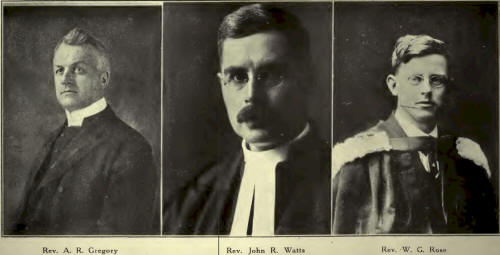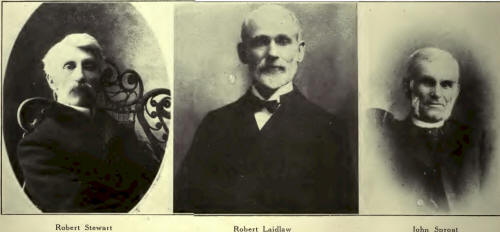|
The Rev. Joseph Alexander of Norval and /Union was
moderator during the vacancy. At the annual meeting on January 5, 1888,
the committee to make repairs and re-paint the Church received a vote of
thanks for the satisfactory work done, and the congregation considered
the building of a manse for the home of the next pastor. Archibald
McGibbon, Robert Stewart, Thomas Aitken, and Alexander Robertson were
appointed a building committee. to which on September 21, 1888, Abram
Stark, John Sproat, James Murray, John T. Elliott, Peter Campbell,
William Hampshire, James Hume and John Stewart were added. John Michie
and John Hardy were chosen to solicit subscriptions towards building the
manse.
On June 20, 1888, a meeting was held to consider the
propriety of making proposals to the neighboring Presbyterian
congregation to take steps with them to form a union. The Rev. Joseph
Alexander opened the meeting with prayer. After the opinions of members
of the Session and others were heard, a unanimous vote was given that a
union of the two congregations was desirable. The following resolutions
were moved by John T. Elliott, seconded by Robert Stewart and
carried:—“First, That we know of no differences in the views of the
congregations, viz., the Esquesing congregation of the United
Presbyterian Church of North America, and the Boston congregation of the
Presbyterian Church in Canada, either in regard to the essential
doctrines of our holy religion, or in regard to Church government that
should hinder a union of said congregations.
2. “That we believe a union of the two congregations
would be in accordance with the mind of Christ, the King and Head of the
Church, and the effect would be the furtherance of His glory and the
great increase of the influence of His cause in this neighborhood.

3. “That as both congregations are now without a pastor
we deem the present time most favorable for effecting a union.
4. “Resolved, therefore, that we, desiring a union of
these congregations, with a view to carrying out these our desires
direct the secretary of this meeting to transmit a copy of these
resolutions to the Session and congregation of the Esquesing
congregation of the United Presbyterian Church of North America, and
appoint the following members of the congregation together with the
elders, a committee to meet with any committee said congregation may
appoint to consider a basis of union. The committee appointed by this
congregation are Robert Stewart, John T. Elliott, James Hume, Archibald
McGibbon, William Hampshire and John Stewart.
ROBERT STEWART, Secretary
JOSEPH ALEXANDER, Moderator.
At a meeting of the congregation on July 31, 1888, the
Rev. W. J. H. Milne, B. A.,, received a unanimous call to become pastor
of Boston Church, which was starting - out. as a self-sustaining charge,
and George Irving and Robert' Stewart were appointed to prosecute the
call before Presbytery on August 7, Mr. Milne was ordained and inducted
on August 23, 1888, immediately after completing his course in Queen’s
University. A Sabbath evening service was started. The congregation was
united and the commodious brick manse was built in the spring and summer
of 1889. The fact that the people of Boston had now to support a pastor
alone, and that he took hold of his work among them with earnestness and
devotion, created in them a new feeling of interest and a sense of
responsibility, which made the pastorate of Mr. Milne prosperous
throughout. All meetings of the congregation were well sustained. The
practice of giving reports of the different societies at the annual
business meeting, repeating them at the social evening entertainment
afterwards, and printing a financial statement of contributions for
circulation became the custom. In September of 1890 it was decided to
adopt communion cards in place of the metal tokens, which had been used
from the beginning of the Church organization.
The spiritual condition of the Church continued to be
good and additions to the membership were made from year to year. In a
quiet country neighborhood like the Scotch Block the Church was, as it
had always been, the main centre of interest and of religious and moral
influence in the community. A letter received from Mr. Milne says: “I
can say quite truthfully that I am grateful for the experience I had in
Boston Church. The people were exceedingly appreciative of preaching,
and called out the very best that was in me at the time. They were
always thoughtful, kind and loyal. Over and over again they gave me.
tokens of their goodwill and friendship.” Being highly esteemed by his
people and in the community, it was with great regret that they learned
that he had received'a call to the Glebe Church at Otawa. At a meeting
of the congregation on March 3, 1898, to consider the resignation of Mr.
Milne, Robert Stewart, Peter Campbell and John Hampshire were appointed
to attend the meeting of Presbytery and give reasons why Mr. Milne
should not leave Boston Church.
Mr. Milne finished his work on the third Sunday of March,
lacking five months of completing a ten year’s pastorate. A graduate in
Arts and Theology of Queens University he received from the same
institution the honorary degree of D.D. in 1914. Dr. Milne is now
President of Ottawa Ladies’ College.
The elders of Mr. Milne’s pastorate were:—George Irving,
John Michie, John Hardy, Robert Stewart, William Hampshire and John T.
Elliott.

The Rev. C. T. Tough of Hornby, Moderator of Session,
presided at a meeting of the congregation to call a pastor on August 8,
1898, when The Rev. A. R. Gregory was unanimously elected, and George
Irving and Alexander Robertson were appointed to prosecute the call
before Presbytery. Mr. Gregory was a graduate of the University of
Toronto and also of Knox College. He was inducted on Sept. 27, 1898, and
Boston congregation was his first and only charge. He was very earnest
and faithful, both as a preacher and as a pastor, and the work of the
congregation in all its departments was diligently and successfully
carried on throughout his pastorate. W. H. Kerr and Alexander Robertson
were ordained elders on May 14, 1899. The congregation was divided into
districts, and an elder assigned to each district to keep in touch with
the people. Mr. Gregory held many meetings of Session, and considered
with its members methods to awaken spiritual interest in the
congregation, and enlist all in the work of the Church. He gave much
attention to the Sunday School, and for a time had a class on Monday
evening in the Manse for Bible study. He organized a Young People’s
Society, and conducted a weekly prayer meeting on the mountain for
people remote from Church privileges. He taught the duty of systematic
giving to the schemes of the Church, and was zealous and active in
raising money for the Century Fund ordered by the General Assembly,
making a very generous contribution himself. Mrs. Gregory, who had been
Principal of Brantford Young Ladies’ College and resigned that position
to marry Mr. -Gregory, was very efficient as the teacher of the large
Bible class, in the Women’s Missionary Society, and for a time as leader
of the choir. The Rev. Dr. Caven of Knox College preached on Sabbath,
August 24, 1902, when Peter Campbell was ordained as elder. On June 6,
1903, The Rev. Dr. Wardrope preached, and assisted Mr. Gregory at the
Communion Service—the last conducted by him as pastor of Boston Church.
He resigned to Presbytery in September of that year &t the close of a
pastorate of five years. He and Mrs. Gregory removed to Toronto, where
during the following months he took a postgraduate course in Knox
College. In September 1904 he became Principal of Westminster College,
and as an organizer and educator conducted it \vith success. He died in
October, 1911.
The elders who served in Mr. Gregory’s pastorate were
George . Irving, William Hampshire, Robert Stewart, W. H. Kerr,
Alexander Robertson, and Peter Campbell. Airs. McDougal, Mrs. James
Murray and Miss Jennie McCallum served as organists. |
